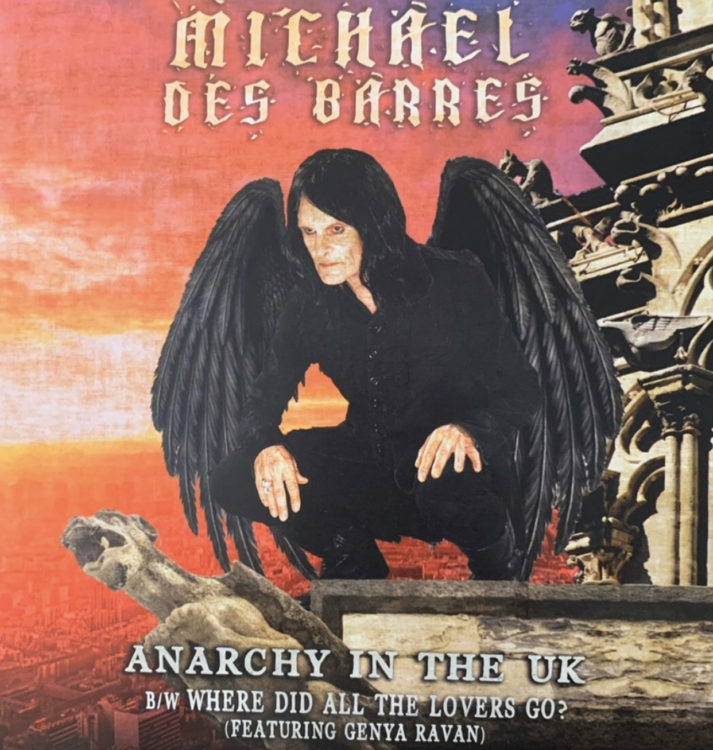
If there’s an endeavour within the entertainment industry that Michael Des Barres hasn’t found some level of success, he probably will do so before he finally shuffles off this mortal coil.
An actor with hundreds of appearances in film and television, including arguably his most memorable role as Murdoc, the felonious foil to the titular hero in the action series MacGyver, Des Barres also has a storied career as a vocalist/songwriter starting in the 1970s with bands such as SIlverhead and Detective, as well as with Chequered Past {featuring members of the Sex Pistols and Blondie] and many solo releases. His voice has appeared in dozens of popular video games, and for the last few years he has hosted the popular Michael Des Barres program every weekday from 8 to 11 a.m. EST {replayed from 9 p.m. to midnight] on Little Steven’s Underground Garage, which is on Sirius XM channel 21.
Oh, and Des Barres wrote the iconic 1980s Animotion dance hit Obsession, he is also the subject of a recently released documentary, Michael Des Barres: Who Do You Want Me To Be, and is crafting a musical. A recovering drug addict and alcoholic, he has earned 39 years of sobriety and over the years has lent his name, talents and stories, to various addiction related causes and charities.
In other words, what a life this individual has led!
Des Barres, the charismatic and talented frontman has returned to the fore more recently, with the release of a new single/video featuring a reimaging of the stalwart punk classic, Anarchy in the UK. The video for the song stars Des Barres, and is as hard-hitting, topical and powerful as it is well-crafted.
Through his radio program, Des Barres has become close friends with ‘Little’ Steven Van Zandt, who is quite the creative polymath himself, with success in the acting field (Silvio Dante in the Sopranos), musically as a solo artist and collaborator with a talented young fella by the name of Bruce Springsteen, as well as a podcast and satellite radio empresario. Van Zandt offered his pal a place to display his musical wares to the world a few years ago (Wicked Cool Records), which is how this remarkable version of Anarchy in the UK came to pass.
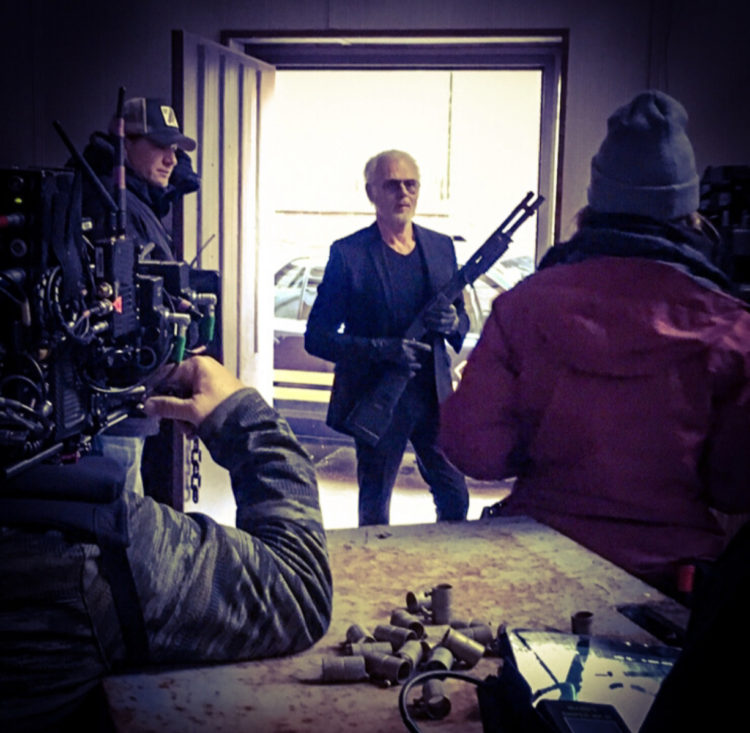
“I originally recorded a duet with Genya Ravan called Where Did All The Lovers Go? which was sort of a 1960s, Marvin Gaye/Tammi Terrell duet thing. She’s such an incredible singer, so we did it and it was produced and put out by Little Steven, and I love this guy. He’s a genius and a very important person, in my point of view, and a very nice man and certainly a mentor for me in a lot of things,” said Des Barres, from his home in Pasadena, California, where he lives with his second wife, Britta, who owns a Pilates studio and helps keep Des Barres super healthy.
“I asked if we could do like an old-school B-side sort of thing to go with it and he suggested we do a punk classic. I said, what if we could make a ballad out of something really ferocious. We were on the phone at the time and he said, ‘hang on,’ and then he played me, on acoustic guitar, the arrangement that you hear now. I sent it immediately to my guys who transposed it and then we did it as a band, and then we had the orchestra come in and Steven was like conducting it over the phone. I just held up the phone and he would say something like, ‘the violins are out of tune.’ It was absolutely one of the most extraordinary musical things that I had ever been through.”
Of course, the original version of the song by The Sex Pistols features an over-the-top, snarling, raging, ragged vocal performance by Johnny Rotten, and a high octane, speed-infused arrangement by the rest of the band. Des Barres version expresses the same intensity of purpose, but with a quiet, resolute, strength.
“It was an amazing thing to take that song, which is so fierce and so amazing and completely revisit it. I was in a band with Jonesy [Pistols’ guitarist Steve Jones] so I have always really appreciated the Sex Pistols for what Lydon wanted to do and the power of his lyricism and the way he spoke for the working class of England and all of what Johnny Rotten stood for,” said Des Barres.
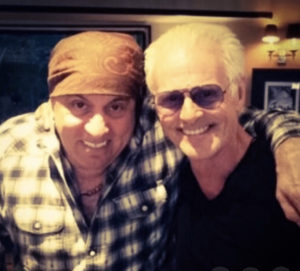
“I thought, you know, it makes just as much sense if you slow it down and you really take in each of the words. It’s a warning, it’s not angry. And I have said this before and I will say it again, I am not proselytizing revolution, I am saying take a good clean look at this world. We can’t turn away from racism, for example, when we’ve seen a man [George Floyd] murdered on an iPhone by a cop. You can’t go back. I think of the strange symbiosis of moments of this song coming out after all of that shit had gone down. And then Steven wanted to make a video that exemplified and symbolized what that was, and that’s a very controversial thing to do these days, you know. I complied as long as I could portray a character in the video that was more nihilistically looking at these events and not judging them. And that’s the thing, you can’t judge what’s going on, there’s no pros and cons to weigh. You’ve got to be singularly oppositional, but not judgemental and that’s a strange place to be, especially artistically in a rock band. The result is completely current, and the strange timing astonishes us all. There’s a lot of people on that record, a lot of musicians, and they were all playing it for their families since it came out. It just came from nowhere, it’s the strangest thing.
“We did the song, and the video on the manner that we did because I want people to pay attention to what’s happening in their lives and in their world. We’ve been anaesthetized with lies and it is important to open our eyes and the secrets be damned. That’s why we included a murder in a rock and roll video. The man [Floyd] was murdered in full view and captured on an iPhone. How can you possibly ignore that? Like Dave Chappelle said, eight forty f***ing six is right. I am 72 years old and I can say whatever I want, and nobody can take it away from me. And I feel absolutely bulletproof and I will do absolutely whatever it takes to change this unbelievably anaesthetized society.”
Proceeds from the sale of the single, in both digital and physical vinyl formats, go to a charity meticulously sourced by both Des Barres and Van Zandt – The Poor People’s Revival: A National Call for Moral Revival.
“it is a beautiful, humanistic organization which is about morality. It’s about who are you? Clearly, we’re all equal. That is inarguable and it’s absurd to even go there. Whatever sex you are, who cares? We’re all different sizes, I don’t care. It’s your soul, and you are a part of me just as I am a part of you. It’s the most non-compartmentalized campaign that we could think of. Steven knows the guy and we discussed this, so once I’ve paid the band, all the money goes there,” he said, also commenting on what his friend Steve Jones things of his version of Anarchy in the UK.
“Steve Jones is one of my dearest friends and he said to me, [adopting Jones’ heavy east London accent] Michael, I think it’s like a poem. It’s an opera like. It’s sounding really exciting to see and great to see something like that done in a different way.’ He was 20 years old when he first played that with the Pistols – 20 years old, when he helped write it, and he also played bass on the record, Never Mind the Bollocks. So, in a wonderful way, he has championed this version.”
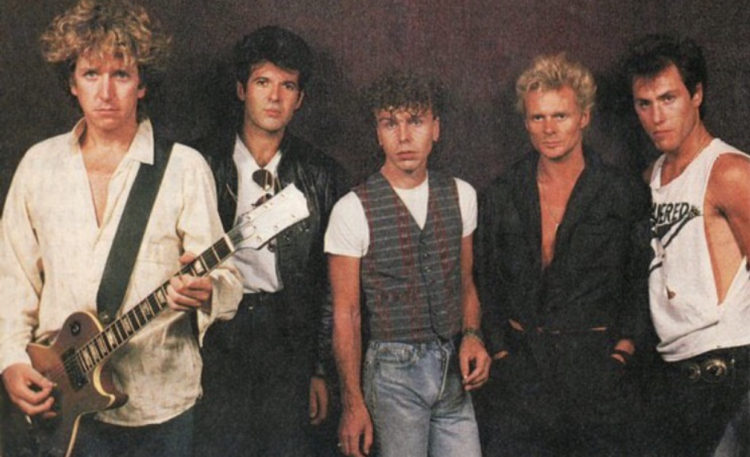
The documentary about Des Barres life, Who Do You Want Me To Be, has been in the works for a number of years, and was finally released on multiple streaming platforms on July 10. It charts Des Barres’ life and career through his various incarnations as an actor starting with the legendary film To Sir, With Love as a teenager, through his addiction and hedonistic days a rock and roller, once under the tutelage of Jimmy Page, to sobriety and a career renaissance on both the small screen, big screen and recording studio.
“I was doing a TV show, I can’t remember which one, and there was a brilliant comedian and writer [J. Elvis Weinstein] who was working on the show. He was very politicised, and he knew my stuff and all of this shit and asked if I minded if he delved into my life a little bit. He did and came back about a year later with a whole bunch of different ideas, and it started from there. We got a cast of people to participate: Gabriel Byrne, Don Johnson, John Taylor, Steve Jones, Johnny Depp etc. etc. etc., and he put it together as the director. There are lots of amazing stories of my journey over the last 50, 60 years. From Sidney Poitier to Jimmy Page to Steve Jones to playing at Live Aid, the villainous Murdoc [his recurring character on both the original and rebooted TV series MacGyver]. There are so many things in there, the ups and downs, and all about my parents and my father’s title [Michael is the 26th Marquis Des Barres, a hereditary title that started in 13th century France] even though I didn’t know him and she was a stripper and a schizophrenic who went mad, so I went to these boarding schools and came out at 16 and did To Sir, With Love. It’s a hell of a f***ing story,” he explained.
“Years went by because of all the licencing involved. All these things I’ve done over the years, all of it had to be licenced. Then I got the gig doing the morning show on Little Steven’s Underground Garage on Sirius XM, so Steven now had to be in it. So, in all, it’s taken eight years. And now it’s done and out and I am very excited about it. But it’s not about posterity for me. I don’t believe in legacies, not really. To me what really matters is not the result but the work, the art itself. The thing about art is if you start being ambitious and wanting people to know what you think, well that though dissipates. I think you do what you do right in the moment and that’s it. And then go on to the next thing, and the next thing and the next thing. I can’t think about what other people think because there’s always going to be somebody who dislikes what you do. I have been lucky, though. I haven’t really had the troll thing happen to me, which is gratifying. And whenever they do crop up, I blow them a kiss. But I don’t believe in what I leave behind, I believe in what I am doing, which is the oldest metaphysical thing in the world. I just believe it’s true.
“What do I want people to take away from this documentary? I think people will be amused, entertained and instructed. I think there’s a spiritual side to it and to my longevity. You see, I am not a member of Club 27. I didn’t throw myself out of a window like [55-year-old Hollywood-based producer/philanthropist] Steve Bing [on June 22]. I am here. I am staying here for as long as I possibly can, and that’s the mission. I am not interested in what anybody thinks, it doesn’t matter. It just doesn’t matter. We’re all stars. Andy [Warhol] was right, but I would just extend the 15 minutes.”
Among other highlights performed at Live Aid as part of The Power Station [replacing a recently-departed Robert Palmer].
“Nobody really knew what Live Aid was at the time. Ozzy Osbourne thought it was a hotel,” he said, with a chuckle.
To the delight of viewers at the time, Des Barres portrayed ‘Dog’, lead vocalist and mayhem maker for the fictitious band Scum of the Earth on one of the most popular episodes of hit late 1970s/early 1980s TV show WKRP in Cincinnati.
“The thing about that was, I was still in the band Detective {until late 1979] and I was a junkie at the time. But they wrote the band to be Punk rockers and they were making fun of safety pins and all that. And I said, no no no, that’s way to obvious. Put them in suits and ties, it’s so much more sinister and therefore funnier. And they did and we also played it really posh and they also changed the dialogue. Because I was so stoned, I had no qualms about making these suggestions and told them to do it my way because it would be funny, and it was. And it’s become a classic episode, it really touched a nerve,” he said.
Always busy, between his radio show and other musical endeavours, Des Barres said he is currently working on writing the ‘book’ and music for a musical about the infamous French nobleman, The Marquis De Sade.
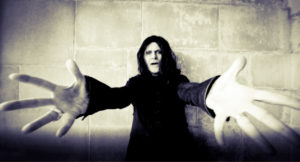 “It’s really coming along well, and I am very excited about it. And we’re writing an album for it; there are about 25 to 30 songs. I wrote it because I am very interested in him as a cultural writer because his work is unbelievable. And I think the madness of his story [he was kind of hedonistic Jim Morrison/Russell Brand of his day] will make a lot of sense today. That part of French history, revolutionary France, is very much my family. Des Barres is an 800-year-old title, so I’ve always been interested in French history,” he explained.
“It’s really coming along well, and I am very excited about it. And we’re writing an album for it; there are about 25 to 30 songs. I wrote it because I am very interested in him as a cultural writer because his work is unbelievable. And I think the madness of his story [he was kind of hedonistic Jim Morrison/Russell Brand of his day] will make a lot of sense today. That part of French history, revolutionary France, is very much my family. Des Barres is an 800-year-old title, so I’ve always been interested in French history,” he explained.
“I have been concentrating on this, when I have the f***ing time. I have done the book, which in opera is called the libretto or the story, and then you’ve got the musical score. So, I have written all of the lyrics and am working on the music. It’s so diverse, somewhat like Hamilton. You’ve got the various characters and each one of them is represented by their own genre of music. Robespierre was one of the main instigators of the French Revolution, so he is Punk. And the King and his Queen Marie Antoinette are sort of like Beyoncé and Jay Z and the music reflects that. It is ironic and histrionic, and I think people are going to enjoy it. It’s all different kinds of music which is fascinating because I am a rock and roller. But I have learned a lot about arrangements and orchestrations from Van Zandt over the last five years, He isn’t collaborating with me on this, but he will be involved in some capacity when the time is right.”
For more information on all of Des Barres various activities, visit www.michaeldesbarres.com.
- Jim Barber is a veteran award-winning journalist and author based in Napanee, ON, who has been writing about music and musicians for nearly 30 years. Besides his journalistic endeavours, he now works as a communications and marketing specialist. Contact him at jimbarberwritingservices@gmail.com.
